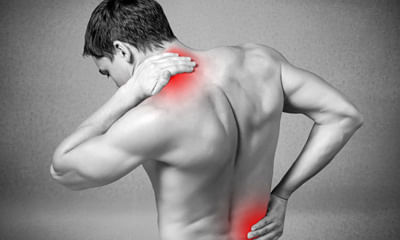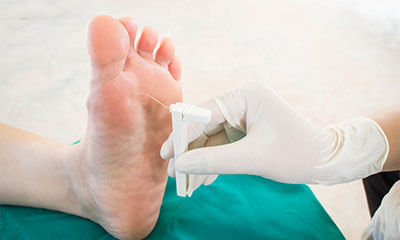Medicine For Sarcoidosis
I am recently feeling pricking in my fingers of both legs, pain in my calf muscle of left leg and sometimes a burning se ...
Ask Free Question
A burning sensation in your feet may be caused by nerve damage in the legs, also called neuropathy. Although many medical conditions can cause burning feet, diabetesis the most common. Most burning feet treatments focus on preventing further nerve damage and reducing pain. Causes of burning feet most often, neuropathy is the cause of burning feet. Damaged nerve fibers are more likely to become overactive and misfire. The damaged nerves send pain signals to the brain even though there is no wound. In most people with neuropathy, the leg nerves become damaged first. These people often have tingling and numbness in the feet as well. Many people complain that their feet are overly sensitive to touch (hyperesthesia) and can have varying degrees of burning pain. It can range from mild to disabling. Diabetes and alcohol abuse are by far the most common causes of neuropathy in the legs. Many other conditions can cause neuropathy or a burning sensation in the feet: besides neuropathy, infections and inflammation of the feet can also cause a burning sensation. The most common of these is athlete's foot, an infection of the skin caused by fungus. Peripheral artery disease (pad) also commonly causes burning feet. The poor circulation of blood to the feet may frequently cause pain, tingling, and burning feet, especially while walking. •chronic kidney disease (uremia) •small fiber neuropathy •vitamin deficiency (vitamin b12, folate, and occasionally vitamin b6) •alcohol abuse •low thyroid hormone levels (hypothyroidism) •lyme disease •hiv/aids •amyloid polyneuropathy •drug side effects, including chemotherapy drugs, vitamin b6 overdose, hiv medicines, amiodarone, isoniazid, metformin, and others •erythromelalgia •heavy metal poisoning (lead, mercury, arsenic) •vasculitis (inflammation of bloodvessels) •sarcoidosis •guillain-barre syndrome (gbs) •chronic inflammatory demyelinating polyneuropathy (cidp) •always use the footwear of proper fitting and which is comfortable. •always use socks. Never use shoes without socks. •after a long day work, it is advisable to stretch and also to ice your feet. •provide rest to your feet as much as you can. •avoid the use of alcohol or any narcotic items. •acupuncture or magnetic therapy shall be done whenever possible to keep the nerves active. •follow all the instructions as given by the doctor. Burning foot painburning foot pain is a common complaint, usually as a result of damage to the nerves of the foot or leg. It may develop due to an injury or medical condition either of which can cause compression of the nerves. Our nerves are the structures that carry messages to and from the brain. They tell our muscles when and how to work and are responsible for sensation including pressure and temperature. Damage to the nerves affects how these signals are transmitted. Burning type symptoms may be constant or come and go, vary in intensity and be accompanied by other sensations such as pins and needles or numbness. It all depends on what is causing the problem. Causes of burning foot painaccurate diagnosis of burning foot pain is vital to ensure appropriate treatment is started as soon as possible to prevent further damage. Here we will look at the most common causes of burning pain in feet, how they present, what causes them and how they are treated. Treatmentcold water foot baths, vitamin b supplements, comfortable footwear (mcr chapelles)
Why my foot is burning sensation and also pain it too much how can I relief this situation I am diabetic patient. ...
Ask Free Question
If you are suffering from burning pain or tingling sensation in hands or feet; sharp shooting pain in legs; numbness in hands or feet, then you might be suffering from neuropathic pain. Burning pain in feet •neck pain/low back pain/glutei pain •vit. B12 deficiency •chemotherapy for cancer patients •post-herpes virus infection •post-spine surgery •post-amputation •diseases like spinal cord injury, multiple sclerosis, hiv, lead toxicity, etc. Feet burning sensation a burning sensation in your feet may be caused by nerve damage in the legs, also called neuropathy. Although many medical conditions can cause burning feet, diabetesis the most common. Most burning feet treatments focus on preventing further nerve damage and reducing pain. Causes of burning feet most often, neuropathy is the cause of burning feet. Damaged nerve fibers are more likely to become overactive and misfire. The damaged nerves send pain signals to the brain even though there is no wound. In most people with neuropathy, the leg nerves become damaged first. These people often have tingling and numbness in the feet as well. Many people complain that their feet are overly sensitive to touch (hyperesthesia) and can have varying degrees of burning pain. It can range from mild to disabling. Diabetes and alcohol abuse are by far the most common causes of neuropathy in the legs. Many other conditions can cause neuropathy or a burning sensation in the feet: besides neuropathy, infections and inflammation of the feet can also cause a burning sensation. The most common of these is athlete's foot, an infection of the skin caused by fungus. Peripheral artery disease (pad) also commonly causes burning feet. The poor circulation of blood to the feet may frequently cause pain, tingling, and burning feet, especially while walking. •chronic kidney disease (uremia) •small fiber neuropathy •vitamin deficiency (vitamin b12, folate, and occasionally vitamin b6) •alcohol abuse •low thyroid hormone levels (hypothyroidism) •lyme disease •hiv/aids •amyloid polyneuropathy •drug side effects, including chemotherapy drugs, vitamin b6 overdose, hiv medicines, amiodarone, isoniazid, metformin, and others •erythromelalgia •heavy metal poisoning (lead, mercury, arsenic) •vasculitis (inflammation of bloodvessels) •sarcoidosis •guillain-barre syndrome (gbs) •chronic inflammatory demyelinating polyneuropathy (cidp) •always use the footwear of proper fitting and which is comfortable. •always use socks. Never use shoes without socks. •after a long day work, it is advisable to stretch and also to ice your feet. •provide rest to your feet as much as you can. •avoid the use of alcohol or any narcotic items. •acupuncture or magnetic therapy shall be done whenever possible to keep the nerves active. •follow all the instructions as given by the doctor. Burning foot painburning foot pain is a common complaint, usually as a result of damage to the nerves of the foot or leg. It may develop due to an injury or medical condition either of which can cause compression of the nerves. Our nerves are the structures that carry messages to and from the brain. They tell our muscles when and how to work and are responsible for sensation including pressure and temperature. Damage to the nerves affects how these signals are transmitted. Burning type symptoms may be constant or come and go, vary in intensity and be accompanied by other sensations such as pins and needles or numbness. It all depends on what is causing the problem. Causes of burning foot painaccurate diagnosis of burning foot pain is vital to ensure appropriate treatment is started as soon as possible to prevent further damage. Here we will look at the most common causes of burning pain in feet, how they present, what causes them and how they are treated. Treatmentcold water foot baths, vitamin b supplements, comfortable footwear (mcr chapelles)
Having erection problem from few months having history of sarcoidosis which treated with steroids from 8 years now it's ...
Ask Free Question
Erectile dysfunction (ED) is commonly called impotence. It’s a condition in which a man can’t achieve or maintain an erection during sexual performance. Symptoms may also include reduced sexual desire or libido Exercise regularly. Really. Make it a priority to get outside or go to the gym and walk, run, swim, bike, or do strength training at least 4 times a week. According to a study conducted by Harvard, walking 30 minutes a day caused a 41% drop in risk for ED. Getting regular exercise aids circulation, getting your blood pumping through your entire body. When it's time to sustain an erection, better circulation is key Keep your weight down. Larger waistlines are associated with higher rates of ED.Putting in the work to slim down can lead to huge improvements in the bedroom. Make sure you're eating a healthy diet loaded with plenty of fruits, vegetables, whole grains, lean proteins, and healthy fats. Quit smoking. Smoking can make ED worse, since it interferes with your circulatory system and is linked to diseases that cause ED. If you're having trouble sustaining an erection, now might be the time to give up the cigarettes for good. Avoid alcohol. Alcohol is another substance that has a huge impact on erections. After a few drinks, many men of all ages find it much more difficult to stay hard. Exercise your pelvic floor. The pelvic floor helps the penis stay hard during erections by pressing on a vein that keeps blood from leaving until the erection is over. Men who exercise their pelvic floor have better results than those who rely solely on lifestyle changes to correct erectile dysfunction Remove stressors from your life. Anxiety is one of the biggest culprits when it comes to ED. If you can find a way to destress, you'll be more likely to maintain erections. Think about the biggest sources of stress in your life right now. What can you do to give yourself a break? Practice mindfulness. Do you find yourself getting distracted by worries instead of living in the moment during sex? Mindfulness is the act of being completely in the present, both physically and mentally. Clear your mind and focus on the sensations your body is feeling during sex Communicate with your partner. Do you feel comfortable and accepted when it comes to your sexual performance? If you're worried about meeting your partner's too-high expectations or living up to some kind of standard, it will be harder to maintain an erection - it's called performance anxiety. If you think your partner's judgement might be hindering your ability to have satisfying sex, you need to communicate your needs and find ways to make your sexual environment more inviting. Learn more about sex. If you have deep-rooted anxieties or guilt related to sex, these negative emotions might be causing your ED. Learning more about sex can be a good way to feel more comfortable with your body and better understand your needs in bed. Read up on sex techniques or take a sex positive workshop as a way to open your mind to new possibilities and increase your comfort level. FOR MEDICATION CONSULT ONLINE IN PRIVATE
My father is diabetic and has neuropathy issue and uses to stick to walk outside home, so left leg has less sensation. I ...
Ask Free Question
Prevention of neuropathy: 1. Avoid alcohol consumption and cigarette smoking. 2. Maintain ideal body weight/bmi (body mass index) 3. Lifestyle changes: daily exercises (>30 minutes per day) or brisk walking or swimming; avoid prolonged sitting or standing (>30 minutes). 4. Food/diet should have following components: •green vegetables e.g. Spinach, fenugreek leaves (methi), radish, etc •coloured vegetables e.g. Tomato, carrot, capsicum (green/red), ladies-finger (bhindi) •milk products e.g. Milk, buttermilk, curd, cheese (paneer) •protein-rich foods e.g. Fish, egg, chicken, pulses (daal) •fibre-rich foods e.g. Bran, oats, brown-rice •fruits e.g. Apple, orange, guava, papaya, pomegranate, berries 5. Blood sugar control (in diabetics) 6. Care of feet: •regular inspection of feet (with mirror) •comfortable, well-fitted shoes •regular consultation with a podiatrist •treatment of wounds, foot deformities 7. Adequate sleep 8. Warm water bath (increases blood flow to the affected area) treatment: •consult pain medicine specialist. •neuropathic painkillers e.g. Amitriptyline, pregabalin, gabapentin, capsaicin, duloxetine, etc. •vit. B12 supplements, anti-oxidants, multi-vitamins. •transcutaneous electrical nerve stimulation (tens) •acupuncture •relaxation and yoga •neural prolotherapy a burning sensation in your feet may be caused by nerve damage in the legs, also called neuropathy. Although many medical conditions can cause burning feet, diabetesis the most common. Most burning feet treatments focus on preventing further nerve damage and reducing pain. Causes of burning feet most often, neuropathy is the cause of burning feet. Damaged nerve fibers are more likely to become overactive and misfire. The damaged nerves send pain signals to the brain even though there is no wound. In most people with neuropathy, the leg nerves become damaged first. These people often have tingling and numbness in the feet as well. Many people complain that their feet are overly sensitive to touch (hyperesthesia) and can have varying degrees of burning pain. It can range from mild to disabling. Diabetes and alcohol abuse are by far the most common causes of neuropathy in the legs. Many other conditions can cause neuropathy or a burning sensation in the feet: besides neuropathy, infections and inflammation of the feet can also cause a burning sensation. The most common of these is athlete's foot, an infection of the skin caused by fungus. Peripheral artery disease (pad) also commonly causes burning feet. The poor circulation of blood to the feet may frequently cause pain, tingling, and burning feet, especially while walking. •chronic kidney disease (uremia) •small fiber neuropathy •vitamin deficiency (vitamin b12, folate, and occasionally vitamin b6) •alcohol abuse •low thyroid hormone levels (hypothyroidism) •lyme disease •hiv/aids •amyloid polyneuropathy •drug side effects, including chemotherapy drugs, vitamin b6 overdose, hiv medicines, amiodarone, isoniazid, metformin, and others •erythromelalgia •heavy metal poisoning (lead, mercury, arsenic) •vasculitis (inflammation of bloodvessels) •sarcoidosis •guillain-barre syndrome (gbs) •chronic inflammatory demyelinating polyneuropathy (cidp) •always use the footwear of proper fitting and which is comfortable. •always use socks. Never use shoes without socks. •after a long day work, it is advisable to stretch and also to ice your feet. •provide rest to your feet as much as you can. •avoid the use of alcohol or any narcotic items. •acupuncture or magnetic therapy shall be done whenever possible to keep the nerves active. •follow all the instructions as given by the doctor. Radiculopathy, also commonly referred to as pinched nerve, refers to a set of conditions in which one or more nerves are affected and do not work properly (a neuropathy). This can result in pain (radicular pain), weakness, numbness, or difficulty controlling specific muscles.[1] in a radiculopathy, the problem occurs at or near the root of the nerve, shortly after its exit from the spinal cord. However, the pain or other symptoms often radiate to the part of the body served by that nerve. For example, a nerve root impingement in the neck can produce pain and weakness in the forearm. Likewise, an impingement in the lower back or lumbar-sacral spine can be manifested with symptoms in the foot. The radicular pain that results from a radiculopathy should not be confused with referred pain, which is different both in mechanism and clinical features. This should be due to the sciatic nerve compression in the right side probably close to your l5 vertebrae. It can also be due to the strain on the left leg, try wearing mcr chappals which would help you to get relieved from pain. Juice helps you to get cleansed with toxins. Ginger in general is good for joint pain and honey / black pepper helps you to get rid out of toxins quickly increase rom- free active exercises of lumbar spine. Pelvic tilting forward, backward in crook lying, quadriped, sitting and standing. Mobilization- restoration of intersegmental mobility by accessory pressure enables the patient to regain full functional painfree movement.
I have a bit cough since may, 2020 and in june I had a cavity 19. After recovery from the cavity 19, my cough did not cu ...
Ask Free Question
Yes you shd continue with steriods and steriod dosage is right for your weight. But I wouldn have started you on anti tb meds unless you developed any symptoms of it.
I am suffering from neurological pain in my foots and feeling weakness in my legs. ...
Ask Free Question
Prevention of neuropathy: 1. Avoid alcohol consumption and cigarette smoking. 2. Maintain ideal body weight/bmi (body mass index) 3. Lifestyle changes: daily exercises (>30 minutes per day) or brisk walking or swimming; avoid prolonged sitting or standing (>30 minutes). 4. Food/diet should have following components: •green vegetables e.g. Spinach, fenugreek leaves (methi), radish, etc •coloured vegetables e.g. Tomato, carrot, capsicum (green/red), ladies-finger (bhindi) •milk products e.g. Milk, buttermilk, curd, cheese (paneer) •protein-rich foods e.g. Fish, egg, chicken, pulses (daal) •fibre-rich foods e.g. Bran, oats, brown-rice •fruits e.g. Apple, orange, guava, papaya, pomegranate, berries 5. Blood sugar control (in diabetics) 6. Care of feet: •regular inspection of feet (with mirror) •comfortable, well-fitted shoes •regular consultation with a podiatrist •treatment of wounds, foot deformities 7. Adequate sleep 8. Warm water bath (increases blood flow to the affected area) treatment: •consult pain medicine specialist. •neuropathic painkillers e.g. Amitriptyline, pregabalin, gabapentin, capsaicin, duloxetine, etc. •vit. B12 supplements, anti-oxidants, multi-vitamins. •transcutaneous electrical nerve stimulation (tens) •acupuncture •relaxation and yoga •neural prolotherapy a burning sensation in your feet may be caused by nerve damage in the legs, also called neuropathy. Although many medical conditions can cause burning feet, diabetesis the most common. Most burning feet treatments focus on preventing further nerve damage and reducing pain. Causes of burning feet most often, neuropathy is the cause of burning feet. Damaged nerve fibers are more likely to become overactive and misfire. The damaged nerves send pain signals to the brain even though there is no wound. In most people with neuropathy, the leg nerves become damaged first. These people often have tingling and numbness in the feet as well. Many people complain that their feet are overly sensitive to touch (hyperesthesia) and can have varying degrees of burning pain. It can range from mild to disabling. Diabetes and alcohol abuse are by far the most common causes of neuropathy in the legs. Many other conditions can cause neuropathy or a burning sensation in the feet: besides neuropathy, infections and inflammation of the feet can also cause a burning sensation. The most common of these is athlete's foot, an infection of the skin caused by fungus. Peripheral artery disease (pad) also commonly causes burning feet. The poor circulation of blood to the feet may frequently cause pain, tingling, and burning feet, especially while walking. •chronic kidney disease (uremia) •small fiber neuropathy •vitamin deficiency (vitamin b12, folate, and occasionally vitamin b6) •alcohol abuse •low thyroid hormone levels (hypothyroidism) •lyme disease •hiv/aids •amyloid polyneuropathy •drug side effects, including chemotherapy drugs, vitamin b6 overdose, hiv medicines, amiodarone, isoniazid, metformin, and others •erythromelalgia •heavy metal poisoning (lead, mercury, arsenic) •vasculitis (inflammation of bloodvessels) •sarcoidosis •guillain-barre syndrome (gbs) •chronic inflammatory demyelinating polyneuropathy (cidp) •always use the footwear of proper fitting and which is comfortable. •always use socks. Never use shoes without socks. •after a long day work, it is advisable to stretch and also to ice your feet. •provide rest to your feet as much as you can. •avoid the use of alcohol or any narcotic items. •acupuncture or magnetic therapy shall be done whenever possible to keep the nerves active. •follow all the instructions as given by the doctor. Burning foot painburning foot pain is a common complaint, usually as a result of damage to the nerves of the foot or leg. It may develop due to an injury or medical condition either of which can cause compression of the nerves. Our nerves are the structures that carry messages to and from the brain. They tell our muscles when and how to work and are responsible for sensation including pressure and temperature. Damage to the nerves affects how these signals are transmitted. Burning type symptoms may be constant or come and go, vary in intensity and be accompanied by other sensations such as pins and needles or numbness. It all depends on what is causing the problem. Causes of burning foot painaccurate diagnosis of burning foot pain is vital to ensure appropriate treatment is started as soon as possible to prevent further damage. Here we will look at the most common causes of burning pain in feet, how they present, what causes them and how they are treated. Treatmentcold water foot baths, vitamin b supplements, comfortable footwear (mcr chapelles)
I am suffering form sarcoidosis v/s. Tuberculosis on 2015 treated from aiims and I am cure on 2017 after that no medicin ...
Ask Free Question
Dear Mr. lybrate-user, weight increase could be due to steroid use. If you are not using steroids as medication, then you need to get your thyroid and a1c levels checked for thyroid & sugar diseases. Polysomnography is beneficial for sleep apnea patients (who snore a lot), for other cough & breathlessness, pft test is recommended. Try to be more active, follow a strict diet chart, do regular exercise. Wishing you good health.
Hello dr, I have a fungal infection /ringworm starting my both legs proceeding towards back side from last 6 months I ha ...
Ask Free Question
Hi lybrate-user, since you are taking steroid tabs, fungal infections spread faster. Only creams might not be sufficient. Consult a dermatologist and take oral anti fungal medication.
I am 42 years old. I have been a hour patient and taking zyloric 300 mg continuously from the past 3 months. However, si ...
Ask Free Question
Feet burning sensation a burning sensation in your feet may be caused by nerve damage in the legs, also called neuropathy. Although many medical conditions can cause burning feet, diabetesis the most common. Most burning feet treatments focus on preventing further nerve damage and reducing pain. Causes of burning feet most often, neuropathy is the cause of burning feet. Damaged nerve fibers are more likely to become overactive and misfire. The damaged nerves send pain signals to the brain even though there is no wound. In most people with neuropathy, the leg nerves become damaged first. These people often have tingling and numbness in the feet as well. Many people complain that their feet are overly sensitive to touch (hyperesthesia) and can have varying degrees of burning pain. It can range from mild to disabling. Diabetes and alcohol abuse are by far the most common causes of neuropathy in the legs. Many other conditions can cause neuropathy or a burning sensation in the feet: besides neuropathy, infections and inflammation of the feet can also cause a burning sensation. The most common of these is athlete's foot, an infection of the skin caused by fungus. Peripheral artery disease (pad) also commonly causes burning feet. The poor circulation of blood to the feet may frequently cause pain, tingling, and burning feet, especially while walking. •chronic kidney disease (uremia) •small fiber neuropathy •vitamin deficiency (vitamin b12, folate, and occasionally vitamin b6) •alcohol abuse •low thyroid hormone levels (hypothyroidism) •lyme disease •hiv/aids •amyloid polyneuropathy •drug side effects, including chemotherapy drugs, vitamin b6 overdose, hiv medicines, amiodarone, isoniazid, metformin, and others •erythromelalgia •heavy metal poisoning (lead, mercury, arsenic) •vasculitis (inflammation of bloodvessels) •sarcoidosis •guillain-barre syndrome (gbs) •chronic inflammatory demyelinating polyneuropathy (cidp) •always use the footwear of proper fitting and which is comfortable. •always use socks. Never use shoes without socks. •after a long day work, it is advisable to stretch and also to ice your feet. •provide rest to your feet as much as you can. •avoid the use of alcohol or any narcotic items. •acupuncture or magnetic therapy shall be done whenever possible to keep the nerves active. •follow all the instructions as given by the doctor.
I have burning sensation in the sole of my feet. I am taking methotrexate 7.5 mg per week and lefra 10 every day for my ...
Ask Free Question
A burning sensation in your feet may be caused by nerve damage in the legs, also called neuropathy. Although many medical conditions can cause burning feet, diabetesis the most common. Most burning feet treatments focus on preventing further nerve damage and reducing pain. Causes of burning feet most often, neuropathy is the cause of burning feet. Damaged nerve fibers are more likely to become overactive and misfire. The damaged nerves send pain signals to the brain even though there is no wound. In most people with neuropathy, the leg nerves become damaged first. These people often have tingling and numbness in the feet as well. Many people complain that their feet are overly sensitive to touch (hyperesthesia) and can have varying degrees of burning pain. It can range from mild to disabling. Diabetes and alcohol abuse are by far the most common causes of neuropathy in the legs. Many other conditions can cause neuropathy or a burning sensation in the feet: besides neuropathy, infections and inflammation of the feet can also cause a burning sensation. The most common of these is athlete's foot, an infection of the skin caused by fungus. Peripheral artery disease (pad) also commonly causes burning feet. The poor circulation of blood to the feet may frequently cause pain, tingling, and burning feet, especially while walking. •chronic kidney disease (uremia) •small fiber neuropathy •vitamin deficiency (vitamin b12, folate, and occasionally vitamin b6) •alcohol abuse •low thyroid hormone levels (hypothyroidism) •lyme disease •hiv/aids •amyloid polyneuropathy •drug side effects, including chemotherapy drugs, vitamin b6 overdose, hiv medicines, amiodarone, isoniazid, metformin, and others •erythromelalgia •heavy metal poisoning (lead, mercury, arsenic) •vasculitis (inflammation of bloodvessels) •sarcoidosis •guillain-barre syndrome (gbs) •chronic inflammatory demyelinating polyneuropathy (cidp) •always use the footwear of proper fitting and which is comfortable. •always use socks. Never use shoes without socks. •after a long day work, it is advisable to stretch and also to ice your feet. •provide rest to your feet as much as you can. •avoid the use of alcohol or any narcotic items. •acupuncture or magnetic therapy shall be done whenever possible to keep the nerves active. •follow all the instructions as given by the doctor.






